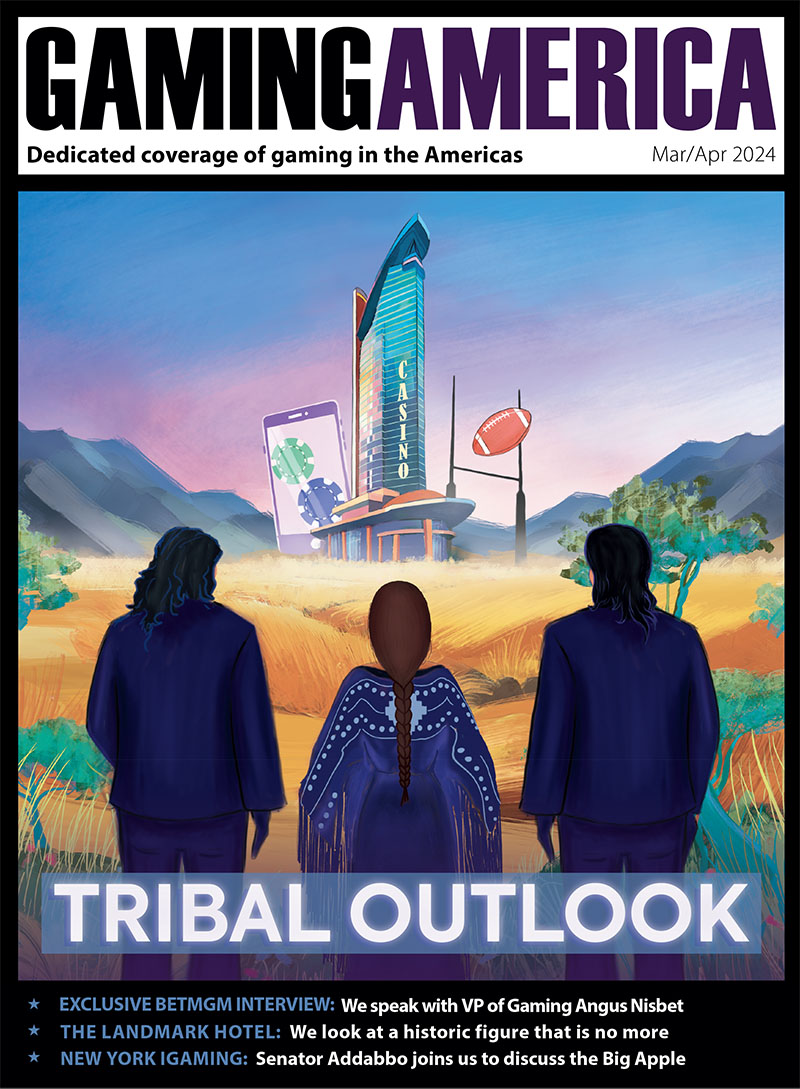
Justin Arnett, VP of Digital Gaming, Potawatomi Casino Hotel
Justin Arnett is the Vice President of Digital Gaming with Potawatomi Casino Hotel in Milwaukee. Justin has 15 years of varied experience in sports betting, ranging from retail operations to mobile development and risk room operations. Beginning his career as a ticket writer in Las Vegas, Justin moved into the risk room, manually trading ahead-of-their-time micro In-Play markets and then ultimately moving into Operations Management in both retail and mobile environments. He has opened four books from scratch in newly legal jurisdictions.
Guy Greene, VP of Online Marketing, Mohegan Digital
Guy Greene is the VP of Online Marketing for Mohegan Digital, which is Mohegan’s iGaming division. Greene has a distinguished history with Mohegan Sun dating back to its opening in 1996. He excelled as the Director of Loyalty Marketing earlier in his career and would also go on to serve as the Director of Consumer Marketing and Direct Marketing for the company. In his current role, Greene is the driving force behind marketing strategies that support MoheganSunCasino.com and PlayFallsViewCasino.com.
Brooke Fiumara, Co-Founder and Co-CEO, OPTX
Brooke Fiumara is the Co-Founder and Co-CEO of OPTX. Prior to co-founding OPTX, Brooke served as the Chief Marketing Officer for Warner Gaming, overseeing all marketing and business intelligence operations for Warner Gaming’s managed and owned properties. Brooke co-chairs the Marketing Committee for the nonprofit organization Global Gaming Women and was honored by Las Vegas Weekly for being an influential 40 under 40; she was nominated as American Executive of the Year by the Global Gaming Awards in 2022.
Steven DeMar, EVP Business Development, Oddsworks
Leading Edge Design has been Steven De Mar’s focus for the last 21 years. Steven has served as director of business development, bringing the company’s slot machines and table games to locations in across the US and Europe. He came out of retirement with his brother to found Oddsworks as one of the first independent North American iGaming aggregators.
How important is it for Tribal operators to embrace online gaming?Justin Arnett: While I believe there will always be a place for brick-and-mortar gaming and entertainment, I think the future will move more and more online. To ensure future growth and protect Tribal sovereignty, I think it is imperative for Tribes to develop new verticals, especially in the online gaming space. It is critical for Tribes to leverage the land-based brands they have worked hard to build for growth in the online space, but also as a feedback loop for their land-based casinos.
Guy Greene: Gaming expansion that has allowed for online casino games and online sports betting is incredibly important for Tribal gaming operators. This is a new, fast-growing, fun and convenient option for players to experience in a world that becomes more digital every day. Mohegan Digital, which is the iGaming division of Mohegan, is live in New Jersey and Connecticut through MoheganSunCasino.com, as well as in Ontario, CA with PlayFallsview.com. The business success, and guest feedback for each of these platforms, have well surpassed expectations. We will be live in Pennsylvania this spring as well, with more details to come.
Brooke Fiumara: From my perspective, the adoption of online gaming by Tribal operators is a strategic long-term move for financial growth and brand equity. The integration of online gaming allows Tribal operations to extend their reach to a wider audience, increase brand recognition; and using tools like OPTX, operations can establish a cohesive experience that seamlessly connects their land-based casinos with online gaming platforms.
Steven DeMar: Online gaming is especially important for Tribal operators as it allows them to expand their player footprint, as well as continue to service and engage their current playerbase. Many Tribal operators draw their playerbase from distant locations. The ever-present threat of finding a similar experience within a shorter distance is an ongoing concern for land-based tribal casinos. IGaming allows operators to protect their current playerbase and expand beyond their geographical reach. They have a strong head start against a new land-based casino as they have direct contact with their playerbase, and can offer a seamless integrated experience using both land-based and online. Operators must get the idea that iGaming is bad for their core business out of their heads. It has been proved time and time again that gaming expansion grows the market.
How big is the opportunity of sports betting for Tribes and could it be bigger than that of land-based casino gaming?Justin Arnett: Sports betting still has enormous growth potential, especially in the digital space. We are in the early days. Of course, every Tribe’s situation is unique, but the opportunities for growth in many jurisdictions are vast, especially if you take into account mobile sports betting. Being able to reach players across your jurisdiction is a powerful thing.
Guy Greene: Mohegan’s flagship property in Connecticut, Mohegan Sun, regularly features special appearances and watch parties inside the Mohegan Sun FanDuel Sportsbook for Football’s biggest game, major UFC Fights, the always-exciting college basketball tournament coming up in March, big-time events like the Kentucky Derby, Pro Basketball’s Post-season and Baseball’s fall classic. These events and widely popular games all contribute to memorable in-person experiences, often shared with friends, that are hard to replicate with online gaming. So even as online sports betting will continue to see impressive growth, the in-person experiences and event driven aspects of on-site Sportsbooks like Mohegan Sun FanDuel Sportsbook, and the Overtime Sports Lounge at Fallsview Casino Resort, will continue to create an interesting balance between online and retail sports betting.
Brooke Fiumara: Sports betting caters to a distinct customer base that complements land-based casino gaming; yet, in my view, it doesn't serve as a substitute for a comprehensive gaming experience. Instead, it acts as an amenity capable of attracting a fresh customer demographic, seamlessly integrating into parallel revenue streams like slots and table games.
Steven DeMar: Sports betting is a bit of a mirage. The volume is growing and growing fast. Mobile sports betting is up to around 30 states and sports betting is now legal in about 38 states. The sheer ability of the market to absorb this kind of dramatic player expansion builds a strong case that sports betting is working, and players want it. The cloud over the forecast is the small margins from sports betting. The win from casino is significantly larger than that of sports. To exceed casino, sports betting would have to grow many multiples in magnitude than it is now. Sports betting is a superb complement to casino, but the math is strongly in casino gaming’s favor as the darling child.
How is the technology changing that Tribes use for gaming?Justin Arnett: Technology is changing extremely fast in the gaming space. Land-based gaming is starting to see some innovations that are intriguing, especially with the introduction of cashless gaming. Cashless has the potential to allow players to seamlessly move their funds where they want them to go. This includes the growing digital space, which has its own technology advancements. In addition to the growth of Class III iGaming, I am also excited about innovations in Class II iGaming. This gives Tribes in jurisdictions where Class III iGaming isn’t permitted by regulation the option to offer iGaming slot products as Class II. Also, I am excited about new sports betting products including AI-driven recommendations, social casinos and more.
Guy Greene: Along with regulations, the adoption of technology by society is allowing for the expansion of sports betting and gaming online. Technology is opening the door to a new gaming customer and an existing traditional market that seeks a real-world experience. To stay current with player trends, traditional operators will need to expand their offering to meet the pace, product and betting habits of emerging player demands.
Brooke Fiumara: The integration of AI technologies into gaming operations is a notable trend, facilitating data analysis, personalized player experiences and operational efficiency. Moreover, Tribes are utilizing data analytics tools to gain insights into player behavior, preferences and trends. The implementation of CRM systems has become indispensable for Tribes, providing effective management of customer relationships, personalized communication, loyalty programs, and targeted marketing campaigns to enhance player engagement and retention. Additionally, in response to evolving preferences and health considerations, Tribes are adopting contactless technologies, reflecting a commitment to a safer and more convenient gaming experience.
Steven DeMar: The gaming platforms in use today for iGaming are mainly first-generation, legacy systems that were created on a proprietary basis for a specific organization. The software was written for giant operators and was very complex, expensive and now, clumsy. Every process seems to take much more time than is actually required due to the cumbersome processes involved with configuration. Today, there are many technology choices available for a platform. Strive and White Hat specifically have tailored their solution to single-point operations. They will both be a strong force in the future for Tribal iGaming. A provider can really buy what they need, rather than just what is available. In the iGaming space, time is money. Every day of delay is a day you can never get back. Multiply that across an enterprise and tech slowdowns can really cripple an organization.
Is the balance between tribal and commercial gaming in the US altering with the emergence of online gaming and sports betting?Justin Arnett: Commercial gaming has taken an early lead in these first days of the expansion of sports betting and online gaming. I think it is important that Tribes work to close that gap and take their future into their own hands. That’s exactly what we are doing by building our own digital footprint that features our own brand and grows our digital expertise. As more Tribal operators blaze that trail to build their digital footprint, I am hopeful that more Tribes will follow suit.
Guy Greene: It is too early to tell but it is giving all operators the opportunity to extend their brand. Each operator sees this opportunity differently. Correct positioning in the market will dictate what brands win in the long run.
Brooke Fiumara: The entry of commercial operators into online gaming and sports betting has the potential to impact the market share traditionally held by Tribal casinos. Some Tribes have entered partnerships or collaborations with commercial gaming entities to navigate the complexities of online gaming and sports betting. These alliances can bring together resources, expertise and market reach for mutual benefit. The rise of online gaming and sports betting is reshaping the landscape, intensifying competition between Tribal and commercial gaming entities. The equilibrium is contingent on continuous regulatory changes, technological progress and strategic choices undertaken by both types of operators.
Steven DeMar: In this author’s opinion, the online iGaming and sports betting space will blur the same way the internet did with retail. Needless to say, the biggest advantage iGaming offers is that it can be used anywhere within a state. Rain or shine, 365 days a year. I believe that ultimately the distribution of casino iGaming skins will reach parity with land-based in commercial casinos. In cases like California, Arizona, Wisconsin, Florida and Connecticut and other states, where only Tribal casinos operate, there will be a major opportunity for Tribal gaming to capitalize on the opportunity their skins present. The creativity and outcome will mostly be determined by how the two entities approach the proposition and each other.

